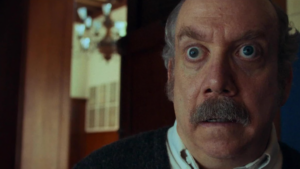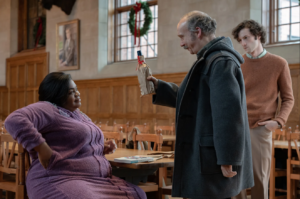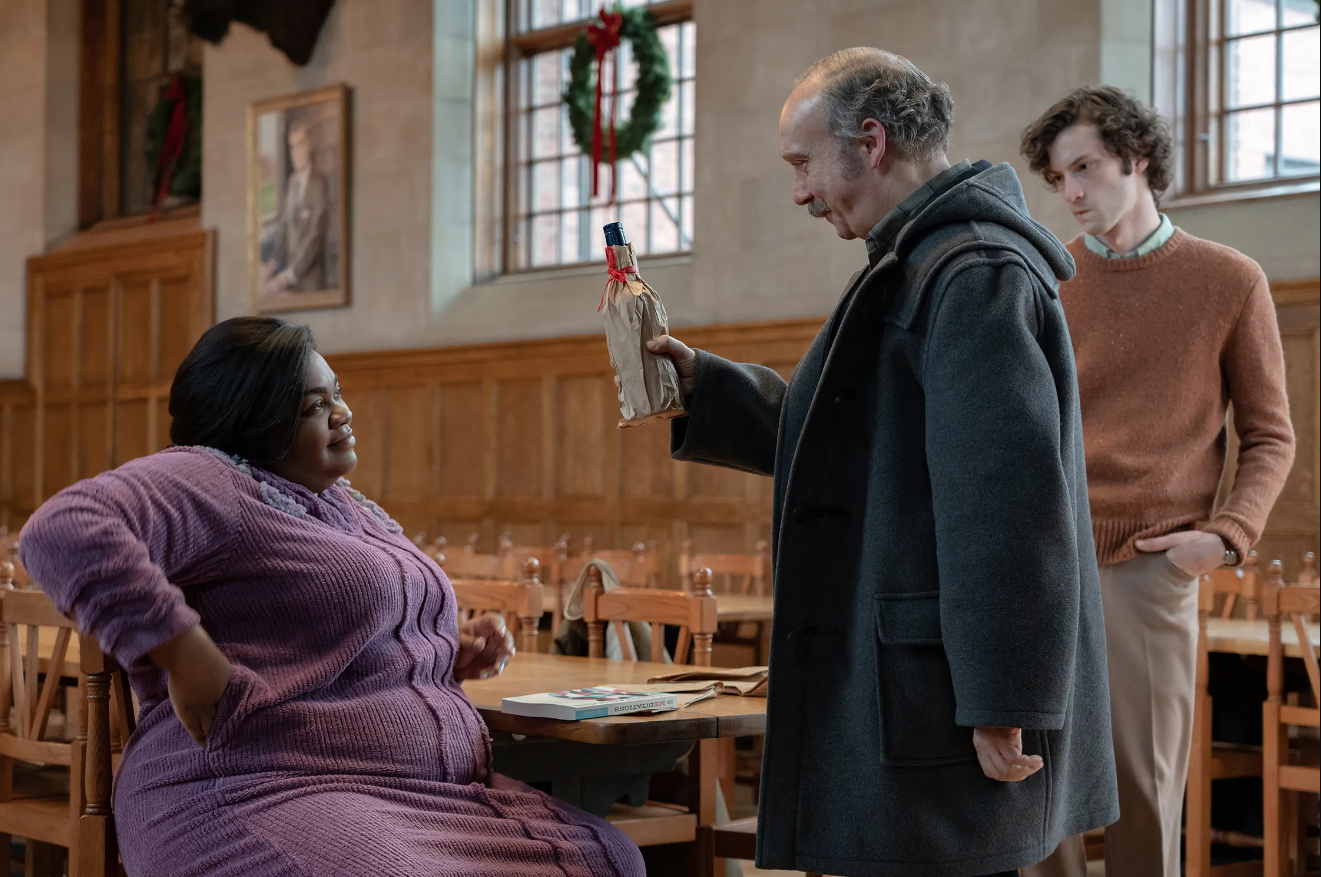In 2004, director Alexander Payne treated us to “Sideways,” a road-trip buddy movie about two forty-something guys and their journey through California’s Napa Valley wine country. It starred Paul Giamatti as a writer/teacher and Thomas Hayden Church as an actor on the verge of his upcoming marriage. Lest you’ve forgotten, this was the film in which Giamatti conducted the funniest drunk dial call in cinema history. “Sideways” was humorous, original, and one of the true joys of the decade.
Now, 19 years later, Payne has reunited with Giamatti to turn in another instant classic, this one called “The Holdovers.” It too is somewhat of a road-trip buddy movie (his forte), but this time the two protagonists begin with an instant dislike for one another. Giamatti plays Paul Hunham, a crotchety, cantankerous professor at fictitious Barton Academy, an all-male prep school located somewhere in New England. Newcomer Dominic Sessa plays Angus Tully, a smart but hot-headed student whose behavior always seems to have him on the brink of expulsion.
At first glance, these two characters could not seem to have less in common. Giamatti’s professor graduated from Barton years earlier, stayed in academia upon his college graduation, and returned to Barton, where he’s taught Ancient Civilization for many years. He despises privileged youth who have no understanding of those less fortunate, and his arrogant, condescending putdowns of his charges often go over their heads – and ours too, but it’s so much fun to watch Giamatti sink his teeth into the role that it hardly matters. He’s a tough grader, who possesses no sympathy toward those kept off a team or out of an exclusive university because of the marks they earn in his class.
in academia upon his college graduation, and returned to Barton, where he’s taught Ancient Civilization for many years. He despises privileged youth who have no understanding of those less fortunate, and his arrogant, condescending putdowns of his charges often go over their heads – and ours too, but it’s so much fun to watch Giamatti sink his teeth into the role that it hardly matters. He’s a tough grader, who possesses no sympathy toward those kept off a team or out of an exclusive university because of the marks they earn in his class.
Sessa’s Angus is Professor Paul’s antithesis – privileged, cocky, and with an entitlement attitude a mile wide. Angus is prepared to pick a fight with any fellow student who even so much as looks at him the wrong way. And because of his family’s place in society, he feels animosity toward any professor who might want to do him wrong.
Unfortunately for both parties, they are forced to spend Christmas break of 1970/71 together on campus. This particular year, Professor Paul is assigned, much to his chagrin, to “babysit” a half-dozen students unable to go home for the holiday. Included in this group is a Korean student whose family cannot afford to fly him back-and-forth more than once a year, and others in similar situations. Angus’ mother and her new husband (who were married the preceding summer) are finally enjoying a tropical honeymoon, which does not involve Angus. She won’t let him stay at home alone, and Angus’ father is deceased.
When most of the group leaves campus for a last-minute skiing trip organized by a father of one of the boys, Paul and Angus (who is unable to reach his mother) are left alone on campus. Joining them are campus chef Mary, played by Da’Vine Joy Randolph (so great in “Dolemite is My Name”), and campus custodian Danny, played by Naheem Garcia. Mary’s son (a Barton student attending on a scholarship) has recently died in Viet Nam. The fact that Mary’s son was drafted into the service is never lost on Professor Paul. The other boys’ families have connections to ensure their service is deferred. Mary’s family does not.
When Angus’ “deserted campus” claustrophobia gets the best of him, he suggests to Paul a road trip to Boston. Knowing Barton’s strict rules, Paul suggests a field trip – therefore coupling the mini-vacation with an outing to a history museum. Mary joins the two, so she can visit her sister’s family. And thus, a journey of unlikely comrades is born. Payne excels at this type of “journey” film. Not only did “Sideways” feature such a structure, but remember Bruce Dern and Will Forte in “Nebraska?” Or Jack Nicholson’s solo expedition in an RV in “About Schmidt?”
Having made the comparison, “The Holdovers” is unique enough to stand on its own. David Hemingson’s original screenplay always keeps us guessing what trouble Angus might get into next – and how Paul might deal with it. Suffice to say neither is particularly healthy.
As might be expected, the two antagonists draw closer as they learn more about one another, and each character’s backstory is revealed. Featuring a predictable structure (particularly for those familiar with Payne’s body of work), “The Holdovers” is original enough to keep us on the edge of our seats. Throughout the film, we eagerly await the next adventure. Given the fact that it takes awhile for the Boston excursion to materialize, the two-hour running time almost feels too short. I could have sat through another subplot during the Boston getaway.
But that’s a minor quibble in an otherwise fantastic film. Alexander Payne films fit like a well-worn pair of slippers. We have a good idea where the story is going, but what a joy it is getting there! And Giamatti has never been better. His frumpy appearance and sad sack face have graced movie screens for many years, and the characters he’s played could not be more different. He’s the male version of Frances McDormand, in that he can play absolutely anything, except the suave leading man – and even then, he’d probably find a way to pull it off. “The Holdovers” could be the vehicle which finally earns Giamatti the Oscar he deserves.
And big accolades too to Randolph, whose Mary character is in many ways the glue that holds the film together – or at least takes Giamatti’s professor character down a notch. Heck, she even introduces him to “The Newlywed Game” on TV. Meanwhile, newcomer Sessa easily holds his own against the seasoned Giamatti. And when I say newcomer, I mean newcomer. Sessa has no acting credits to his resume – not even a television appearance. I can see supporting acting nods for both Randolph and Sessa.
“The Holdovers” instantly ranks alongside the very different “Oppenheimer” as the best film so far this year. It’s a must-see!





